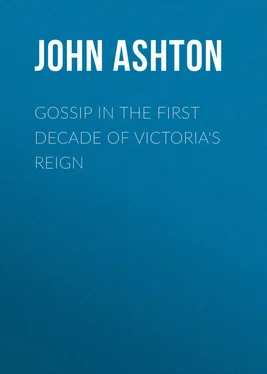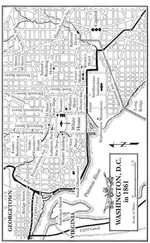John Ashton - Gossip in the First Decade of Victoria's Reign
Здесь есть возможность читать онлайн «John Ashton - Gossip in the First Decade of Victoria's Reign» — ознакомительный отрывок электронной книги совершенно бесплатно, а после прочтения отрывка купить полную версию. В некоторых случаях можно слушать аудио, скачать через торрент в формате fb2 и присутствует краткое содержание. ISBN: , Издательство: Иностранный паблик, Жанр: foreign_antique, foreign_prose, на английском языке. Описание произведения, (предисловие) а так же отзывы посетителей доступны на портале библиотеки ЛибКат.
- Название:Gossip in the First Decade of Victoria's Reign
- Автор:
- Издательство:Иностранный паблик
- Жанр:
- Год:неизвестен
- ISBN:http://www.gutenberg.org/ebooks/30665
- Рейтинг книги:3 / 5. Голосов: 1
-
Избранное:Добавить в избранное
- Отзывы:
-
Ваша оценка:
- 60
- 1
- 2
- 3
- 4
- 5
Gossip in the First Decade of Victoria's Reign: краткое содержание, описание и аннотация
Предлагаем к чтению аннотацию, описание, краткое содержание или предисловие (зависит от того, что написал сам автор книги «Gossip in the First Decade of Victoria's Reign»). Если вы не нашли необходимую информацию о книге — напишите в комментариях, мы постараемся отыскать её.
Gossip in the First Decade of Victoria's Reign — читать онлайн ознакомительный отрывок
Ниже представлен текст книги, разбитый по страницам. Система сохранения места последней прочитанной страницы, позволяет с удобством читать онлайн бесплатно книгу «Gossip in the First Decade of Victoria's Reign», без необходимости каждый раз заново искать на чём Вы остановились. Поставьте закладку, и сможете в любой момент перейти на страницу, на которой закончили чтение.
Интервал:
Закладка:
But, if mechanical science had advanced as far as motor cars, we were, in other ways, still as backward as Belgium and Germany are at the present, in using dogs as draught animals. This practice had increased to such an extent that it was found necessary to placard the walls of the metropolis with the following notice. “Notice is hereby given, that all persons using dogs under carts or trucks, as beasts of burden, after the date hereof, will render themselves liable to be prosecuted, and fined £2, according to the provisions of an obsolete Act lately discovered. London, 18 Aug., 1838.” This scandal did not last long, for in “an Act for further improving the Police in and near the Metropolis,” 2 and 3 Vict., c. 47 [17 Aug., 1839], we find that Section LVI. says, “And be it enacted, That after the First Day of January next, every person who, within the Metropolitan Police District, shall use any Dog for the purpose of drawing, or helping to draw any Cart, Carriage, Truck, or Barrow, shall be liable to a penalty of not more than Forty Shillings for the first offence, and not more than Five Pounds for the Second, or any following offence.” This act was extended to all parts of the Kingdom by the 17 and 18 Vict., c. 60.
On the 13th July the Corporation of the City of London gave a grand banquet, at the Guildhall, to the foreign Princes, Ambassadors extraordinary, and Corps Diplomatique , then in the metropolis, in honour of the Queen’s Coronation; and in order to completely divest the occasion of anything like a political aspect, care was taken to invite, besides the Ministers, an equal number of the élite of both parties in the State. The principal guests went in their state carriages, and the streets were crowded with sightseers who especially welcomed the Duke of Wellington and Marshal Soult. The arrangements and decorations in the Hall were almost the same as those used for the Royal banquet in the previous November, the tables and sideboards were ablaze with plate lent by the various City Companies, and the General Bill of Fare was as follows:
One hundred and twenty tureens of turtle soup, of five pints each; 17 dishes of fish, consisting of salmon, turbot, whitings, tench and eels; 40 haunches of venison; 80 dishes of fowls, capons and pullets; 40 cherry, gooseberry and currant tarts; 30 strawberry tarts; 40 dishes of potatos; 60 dishes of French beans; 30 French pies; 30 pigeon pies; 30 hams; 30 tongues; 2 barons of beef; 37 Chantilly baskets; 30 dishes of peas; 10 sirloins, ribs and rumps of beef; 45 dishes of shell fish; 30 ribs, chines and legs of lamb; 40 dishes of ducklings; 20 turkey poults; 80 jellies; 20 creams; 40 salads and cucumbers; 20 dishes of cauliflowers. Dessert. – Seventy-five pine apples of 2lbs each; 100 dishes of hothouse grapes; 20 melons; 30 dishes of cherries; 100 dishes of strawberries; 40 dishes of currants and gooseberries; 120 cream and water ices, various; 40 dishes of dried fruit; 35 ornamented Savoy cakes; 30 dishes of preserves, biscuits and olives.
Marshal Soult stopped for some time in England, and visited many of the manufacturing towns.
CHAPTER VII
Genesis of “The Charter” – L. & N. W. Railway opened to Birmingham – Overland route to India – A bold smuggler – Bull baiting – Visitors to the Queen – “The Boy Jones.”
Probably nearly all my readers have heard of the “Chartists,” but it is equally probable that few know when the agitation commenced, and the reason for its existence. The “Charter,” as it was called, was the Radical outcome of the Reform Bill of 1832. For a time, after the passing of that Bill, the land had peace, for all reasonable reforms had been granted, but the demagogues were not going to be quietly annihilated, and an agitation for more trenchant reform was got up, and a mass meeting in its favour was held at Birmingham, on the 6th of August, and at it were inaugurated the principles of “The People’s Charter,” as it was called. It is currently reported that this “Charter” was drawn up by William Lovett, a carpenter and cabinet maker, who took an active part in getting rid of the stamp tax upon newspapers; and it is very likely that it was so, for he drew up most of the petitions and addresses for the movement, and, in connection with it, he, the following year, suffered 12 months’ imprisonment. He died Aug. 1877. The demands of this “Charter” were six, and they were familiarly known as the six points. They were:
Universal Suffrage.
Vote by Ballot.
Annual Parliaments.
Payment of the Members.
Abolition of the Property Qualification.
Equal Electoral Districts.
The meeting was got up by T. Atwood, Esq., M.P., and the site chosen for it was a large vacant piece of ground, at Birmingham, on the north-west side of the town, and there drinking booths galore were erected. The morning began very wet, and the different divisions from the neighbouring country marched bemired and bedraggled to the rendezous. There they soon filled the drinking booths, in which they abode; hence, probably, the very diverse statements as to the numbers present at the meeting, which vary from 10,000 to 200,000. The ground chosen was a natural amphitheatre, and, if the weather had been finer, it would have been a pretty sight, enlivened by the bright banners of the different Trades’ Societies. However, Mr. Atwood read the Petition, which embodied the above six points, and moved its adoption. Feargus O’Connor, a well-known firebrand, seconded it in a violent speech, in which occurred the following balderdash.
“On with your green standard rearing,
Go, flesh every sword to the hilt;
On our side is Virtue and Erin,
On yours is the parson and guilt.”
Of course the Motion was enthusiastically carried, and then a very heavy shower of rain terminated the proceedings. The petition was afterwards presented to Parliament by Mr. Atwood on the 14th of June, 1839.
On 17th Sept the London and North Western Railway (then called the London and Birmingham Rly.) was opened throughout to Birmingham; the first train, containing Directors and their friends, leaving Euston at 7.15 a.m. The times of this train are useful for comparing with the present time. “The train left Euston at 15 minutes past 7, but did not take on locomotive until 20 minutes past. It arrived at Tring station at 25 minutes past 8, where there was five minutes’ delay. Arrived at Wolverton at 6 minutes past 9, where the directors alighted and changed engines. The train arrived at Rugby at 11 o’clock, where the Duke of Sussex and his suite alighted, and proceeded by carriage to the place of his destination. The directors remained at Rugby 10 minutes, and arrived at Birmingham 3 minutes past 12, having performed the whole journey, including stoppages, in 4 hours 48 minutes, and, exclusive of stoppages, in 4 hours 14 minutes. This is, unquestionably, the shortest time in which the journey from London to Birmingham has ever been performed, being upwards of two hours less than the time occupied by Marshal Soult and attendants a few weeks ago.”
“The fare for one person from London to Birmingham, or back, by the ‘four inside’ carriages, by day, or the first class, ‘six inside’ by night, will be £1 12s. 6d; by the second-class carriages, open by day, which is the cheapest, it will be £1. The intermediate fares will be £1 10s. and £1 5s.”
It is not generally known that the two lodges at the entrance of Euston Station, were the original ticket office and waiting room.
People were beginning to wake from the torpor in which they had hitherto slumbered, with regard to locomotion, and on 12th October an influential meeting of merchants and others was held at the Jerusalem Coffee House to hear a Captain Barber unfold his scheme for a quicker communication with India. This was that passengers and goods should be taken by steam to Cairo, and thence, by omnibuses and vans to Suez – as was afterwards done by Waghorn, who was already forming an Overland Mail (see Times , 29 Nov., 1838).
Читать дальшеИнтервал:
Закладка:
Похожие книги на «Gossip in the First Decade of Victoria's Reign»
Представляем Вашему вниманию похожие книги на «Gossip in the First Decade of Victoria's Reign» списком для выбора. Мы отобрали схожую по названию и смыслу литературу в надежде предоставить читателям больше вариантов отыскать новые, интересные, ещё непрочитанные произведения.
Обсуждение, отзывы о книге «Gossip in the First Decade of Victoria's Reign» и просто собственные мнения читателей. Оставьте ваши комментарии, напишите, что Вы думаете о произведении, его смысле или главных героях. Укажите что конкретно понравилось, а что нет, и почему Вы так считаете.












